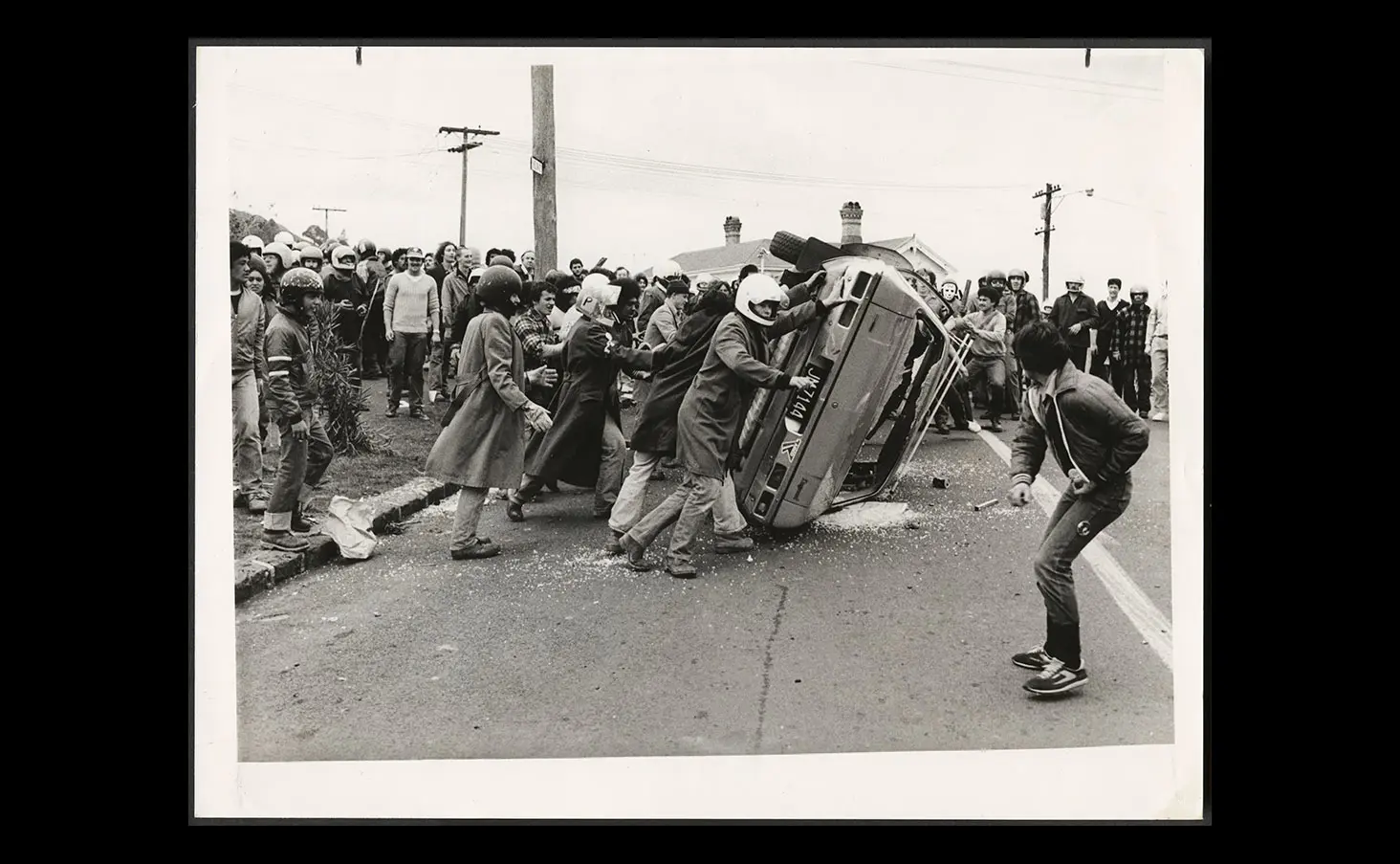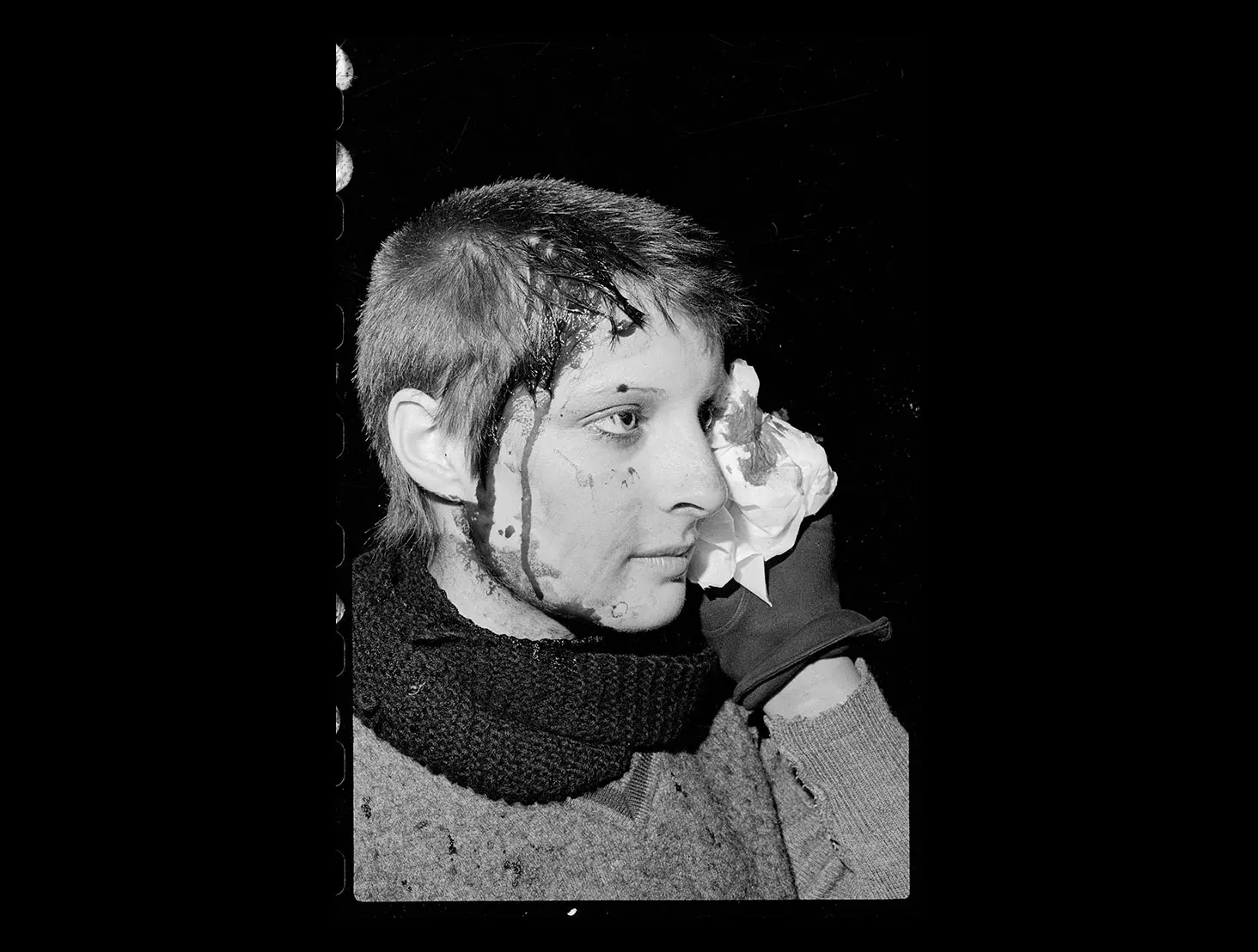Image credit: Anti-Springbok tour demonstrators overturning a car in Onslow Road, Kingsland, Auckland, September 1981 by Auckland Star staff photographer. Ref: EP-Ethics-Demonstrations-1981 Springbok tour-04 Alexander Turnbull Library.

Image credit: Anti-Springbok tour demonstrators overturning a car in Onslow Road, Kingsland, Auckland, September 1981 by Auckland Star staff photographer. Ref: EP-Ethics-Demonstrations-1981 Springbok tour-04 Alexander Turnbull Library.

1981 saw widespread protests across Aotearoa NZ against a tour by the South African rugby team, the Springboks. The tour divided the country and many protestors were injured or arrested. Find out more by exploring our collections and curated resources.
The 1981 Springbok rugby tour of New Zealand caused social ruptures within communities and families across the country. With the National government backing the tour, protests against apartheid sport turned into confrontations with both police and pro-tour rugby fans — on marches and at matches.
South Africa’s race laws had spilled into sporting contacts with New Zealand from the 1920s, when Māori were first barred from All Blacks teams playing the Springboks. ‘No Maoris — No Tour’ was the slogan of the public campaign against the whites-only All Blacks 1960 tour to South Africa, which went ahead anyway.
By 1981, New Zealand’s Halt All Racist Tours was taking the local lead in an international campaign against sporting links with South Africa. Tour supporters were commonly of the view that sport and politics should not mix.
As the three-month Springbok tour proceeded, protest against it grew to unprecedented levels. The police response included two dedicated anti-riot squads: the Red Squad and the Blue Squad. The police donned visored helmets and carried long batons, acquired for use during the tour; protestors protected themselves with crash helmets and makeshift body armour and shields.
Sixteen-year-old school student Karen Brough joined a protest outside Parliament in Wellington early on in the tour. She found herself at the front of the crowd heading up Molesworth Street for a vigil outside the South African Consul-General's house in Wadestown. Police, with batons drawn, lined up across the street and told the crowd to stop. Brough was among those who were forced on by the crush of people behind, and who were then hit with batons and injured. ‘The Battle of Molesworth Street’ marked a change in the tone of the protests, with increasing expectation of violence and civil disobedience by all sides, culminating in scenes like the image taken during the third test in Auckland.
One of this article’s authors was at the time living in a flat near the third test venue, Eden Park. She remembers painting ‘Stop the Tour’ slogans on cardboard with her flatmates, then the group standing around dividing up protective gear to don for the protest. They came up one motorbike helmet shy, and she drew the short straw to stay behind.
At the same time, her father and other rugby fans were fuming on a bus that had been turned away from the grounds because of the protests. Many families were torn by their opposing viewpoints of the tour, and the social disruption both at home and on the streets left deep scars.
Story written by: Jenni Chrisstoffels and Suzanne Hardy
Copyright: Turnbull Endowment Trust
Image credit: Karen Brough, injured during an anti-Springbok rugby tour demonstration in Wellington, July 1981 by Ian Mackley. Ref: EP/1981/2623/21-F Alexander Turnbull Library.

Scenes of turmoil during the 1981 Springbok tour shocked New Zealanders, who were unused to disagreements leading to such widespread and sustained protest and violent encounters. Interviewed 10 years after 'the battle of Molesworth Street', Karen Brough recalled her horror at her treatment. She had been brought up to think that the police were there to protect her, not hurt her.
Read a connected story from Te Kupenga: All-white All Blacks.
Explore the Alexander Turnbull Library collections further: 1981 Springbok tour.
Topic Explorer has Springbok tour 1981.
Many Answers has Springbok rugby tour 1981.
Tikanga ā-iwi:
Te whakaritenga pāpori me te ahurea
Te ao hurihuri.
Te Takanga o Te Wā (ngā hītori o Aotearoa):
Tūrangawaewa
Mana motuhake.
Social sciences concepts:
Identity, culture, and organisation
Continuity and change.
Aotearoa New Zealand’s histories:
Colonisation and its consequences
The exercise of power
Relationships and connections between people.